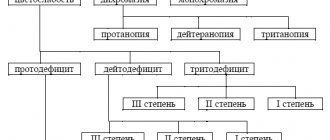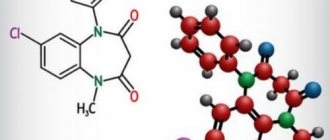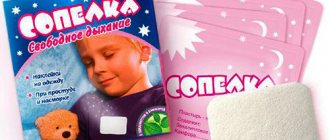Pharmacodynamics and pharmacokinetics
herbal medicine . Depending on the dosage, the drug is characterized by a weak or moderate sedative effect on the human body, due to the effects of the essential oil , a significant part of which is an ester of isovaleric acid and borneol . The alkaloids of the tincture - hotenine and valerine and its compounds valepotriate - also have a calming and relaxing effect .
The sedative effectiveness of the drug develops slowly, depends on the dose and is stable. Valerian drops facilitate the process of entering natural sleep , stabilize its course and have virtually no effect on awakening.
In addition to the sedative effects, the drug exhibits a mild antispasmodic effect and a mild choleretic effect. Taking this drug has a beneficial effect on the secretory functionality of the gastrointestinal tract, dilates the vessels of the coronary system and reduces pathologically rapid heart rate. Stabilization of the activity of the heart muscle is determined by the influence of the active ingredient of the drug on the mechanisms of neuroregulation and its direct effect on the cardiac conduction system and heart automatism. Therapeutic effectiveness is formed with prolonged and systematic use.
Valerian tincture
Registration number: R No. LSR-002591/09
Trade name: Valerian tincture.
Dosage form: Tincture.
Compound:
- Rhizomes with crushed valerian roots - 200 g
- Ethyl alcohol 70% (ethanol) - sufficient amount to obtain 1 liter of tincture
Description: Transparent liquid from light brown to dark brown in color with a reddish tint, with a characteristic aromatic odor. Pharmacological group. Sedative of plant origin.
ATX code: N05CM09
Pharmacological properties. Valerian tincture exhibits a moderate sedative effect. The active principle of the drug is the ester of borneol and isovaleric acid, free valeric acid. The sedative effect occurs slowly, but quite steadily. In addition, the drug has an antispasmodic effect on the smooth muscles of the gastrointestinal tract.
Indications for use:
- Increased nervous excitability, insomnia
- Combination therapy includes functional disorders of the cardiovascular system
- Gastrointestinal spasms
Contraindications:
- Hypersensitivity to the components of the drug
- Pregnancy
- Lactation period
- Children's age up to 1 year
With caution: Chronic enterocolitis.
Directions for use and dosage: Take orally, before meals, diluted in a small amount of water. Adults: 20-30 drops per dose, 3-4 times a day; children: as many drops per dose as a child, 3-4 times a day.
Side effects: Possible lethargy, weakness, drowsiness, depression, decreased performance (especially when used in high doses), and with long-term use - constipation. In some cases, allergic reactions may develop.
Interaction with other drugs: The drug enhances the effect of hypnotics and other drugs that depress the central nervous system, as well as antispasmodics.
Special instructions: With long-term use in large doses, a decrease in psychomotor reactions is possible, which should be taken into account when driving, working with machinery, etc.
Release form: Tincture. 15, 25 ml in orange glass dropper bottles, 25 ml in orange glass bottles. Each bottle or dropper bottle, along with instructions for use, is placed in a cardboard pack.
Storage conditions : Protected from light at a temperature of +12° to +20°C. Keep out of the reach of children.
Shelf life: 2 years. Do not use after the expiration date stated on the package.
Conditions for dispensing from pharmacies: Without a prescription.
Analogs
Level 4 ATC code matches:
Alora
Motherwort extract
Novo-Passit
Cardiovalen
Liked
Carmolis
Lotusonic
Relaxil
Persen Forte
Persen
Phytosed
Sedavit
Motherwort Forte Evalar
Dormiplant
Sondox
Sedafiton
Peony tincture
Menovalen
Bromcamphor
Valerian rhizomes with roots
The most famous substitutes for this drug are herbal drip preparations, similar in their main action to Valerian Tincture: Corvalol , Motherwort , Hawthorn , Peony , Corvaldin , Valocordin , Barboval , Valecard .
Also very popular is a mixture of tinctures of valerian , motherwort , hawthorn , and peony . You can combine these drugs yourself in equal proportions by purchasing all the tinctures separately at the pharmacy and mixing them in a larger glass bottle. You should start taking the prepared tincture of valerian, motherwort, hawthorn, peony with 10-15 drops and, if tolerated, increase the dose to a teaspoon.
Does Valerian Root Help with Anxiety and Insomnia?
Valerian root is a known sedative that can help many people reduce symptoms of anxiety and insomnia. However, research on these effects is inconsistent.
The Evidence-Based Complementary and Alternative Medicine review looked at 17 different articles on the effects of valerian on sleep.
The authors noted that valerian improved sleep indicators such as total sleep time and reduced the severity of insomnia.
However, they say other studies contradict these results, showing that valerian caused little to no difference in these symptoms.
It may be that results vary from person to person, or that some other factors come into play.
For example, a study published in the journal Nature and Science of Sleep looked at a mixture of herbs.
Researchers found that people who took an herbal supplement containing valerian, hops and jujube had significantly improved sleep scores compared to people who did not take the supplement.
While this is promising, the results are based on participants' self-reports. Researchers need to take a deeper look into the effects of valerian root on sleep.
Surprisingly, some people also include valerian root as a natural remedy to treat symptoms of stress, anxiety, and depression.
A 2015 study noted that in animal studies, a valerian compound protected against markers of both physical and mental stress.
This is important because stress, fear and anxiety are often closely related and can affect other problems such as sleep. Future research may also help examine this claim.
Reviews
In the post-Soviet countries, Valerian Tincture has long and consistently received only positive reviews. The only relative disadvantage for some people is the alcohol included in the drug, as a result of which pregnant and lactating women are careful not to drink it.
Also, children do not like the taste of alcohol, as well as the smell of valerian, which is why the use of this tincture in children is limited. Otherwise, valerian drops have been characterized on the positive side for a long time, are included in almost every home medicine cabinet and have no equal in popularity on the pharmaceutical market.
What you need to know about valerian root?
People can take valerian root as a supplement.
Valerian root has a calming effect and reduces anxiety, making it a popular natural sleep aid and promoting calm. Valerian root may work for many, but not everyone. When taking valerian root, it is important to monitor for any side effects.
Everyone should consider talking to a doctor ahead of time about taking valerian root and treating any conditions they may have.
This article reviews the effectiveness of valerian root and discusses its uses, dosage, and more.
Price, where to buy
As a rule, the price of Valerian tincture does not differ much depending on the manufacturer, that is, as much as valerian drops cost from one manufacturer, it will cost the same from another. At this time, the price of 25 ml of tincture fluctuates around 10-20 rubles.
- Online pharmacies in RussiaRussia
- Online pharmacies in UkraineUkraine
Pharmacy Dialogue
- Valerian tincture bottle 25ml Tverskaya FF
32 RUR order - Valerian tincture (25ml bottle) Ivanovskaya farm. f-ka.
28 RUR order
- Valerian tincture (flask 25ml)Flora of the Caucasus
35 rub. order
- Valerian tincture (25ml bottle) Camellia
42 RUR order
- Valerian tincture (25ml bottle) MFF
34 RUR order
show more
How does valerian root work?
Valerian root is a common plant in traditional and folk medicine. Proponents of herbal medicine say that this herb has a relaxing effect that reduces anxiety, allowing you to rest.
A study conducted by Frontiers in Neuroscience found that people around the world recognize valerian as an effective sedative. However, researchers still do not fully understand the effects of this herb.
Compounds in the root appear to interact with important components of the nervous system, such as gamma-aminobutyric acid (GABA) (a chemical messenger in the brain).
A study published in BMC Complementary Medicine and Therapies noted that valerian root compounds, such as valerenic acid, can interact with GABA and its receptors to create a noticeable calming effect.
This is similar to how prescription sleeping pills such as diazepam (Valium) work.
However, how valerian interacts with GABA remains a theory.
Other experts believe that valerian has a calming effect due to the action of powerful antioxidants on areas of the brain associated with stress and emotions, such as the amygdala and hippocampus.
How else can valerian root help?
Some people use valerian root to treat their other symptoms, although there is little formal research on this.
Proponents may recommend valerian for problems such as:
- menstrual cramps
- stomach cramps
- headaches and migraines
- menopause symptoms
Some people may find valerian root an effective remedy for relieving these symptoms.
However, most research on valerian has focused on its use as a sedative, antioxidant, and anti-anxiety agent.
Side effects of taking valerian root
When a person takes valerian, some side effects may occur. The sedative effect of valerian means that drowsiness may be a common side effect.
Although it is helpful for falling asleep at night, daytime sleepiness can affect a person's ability to function. People taking valerian and experiencing daytime sleepiness should reduce their dose.
Some people may experience the following symptoms:
- headache
- dizziness
- itchy skin
- stomach upset









